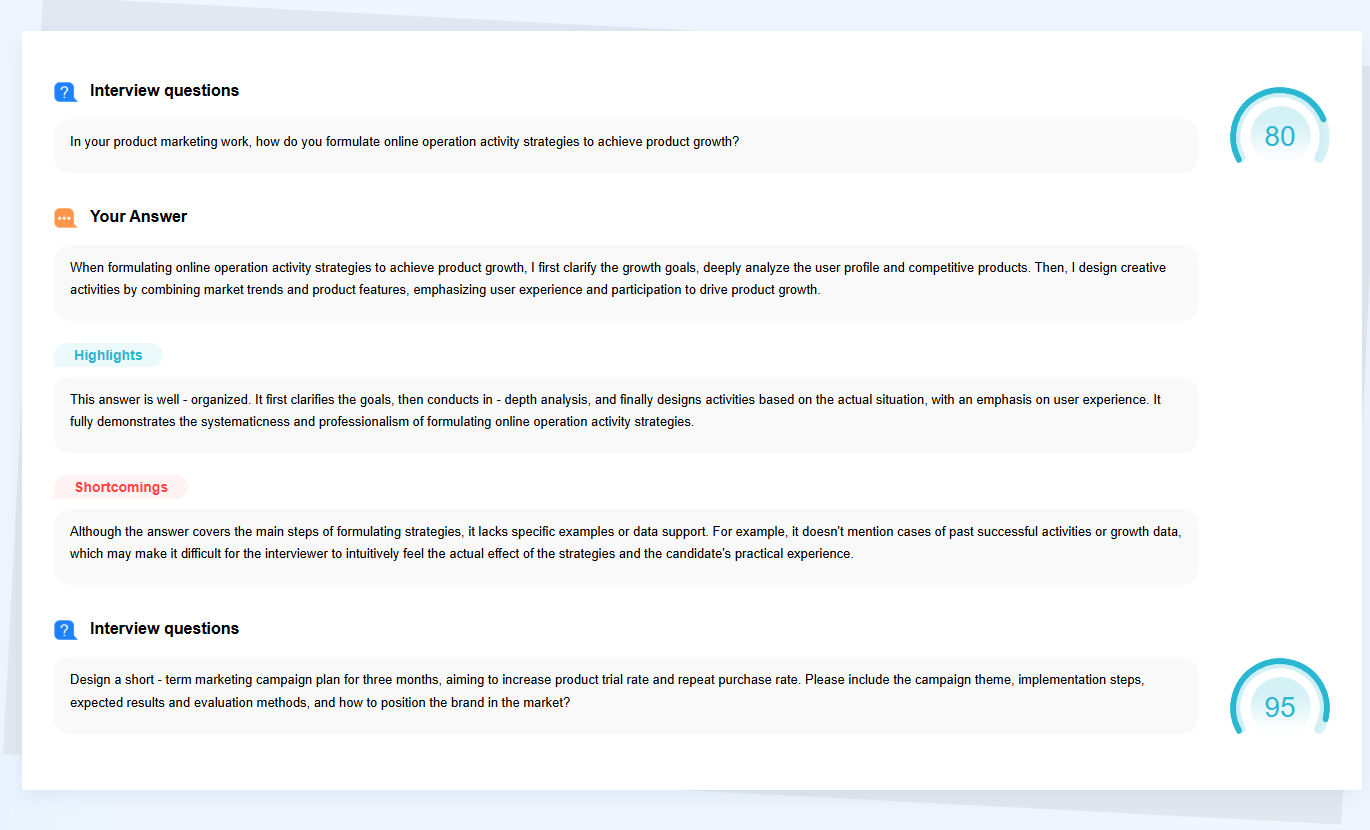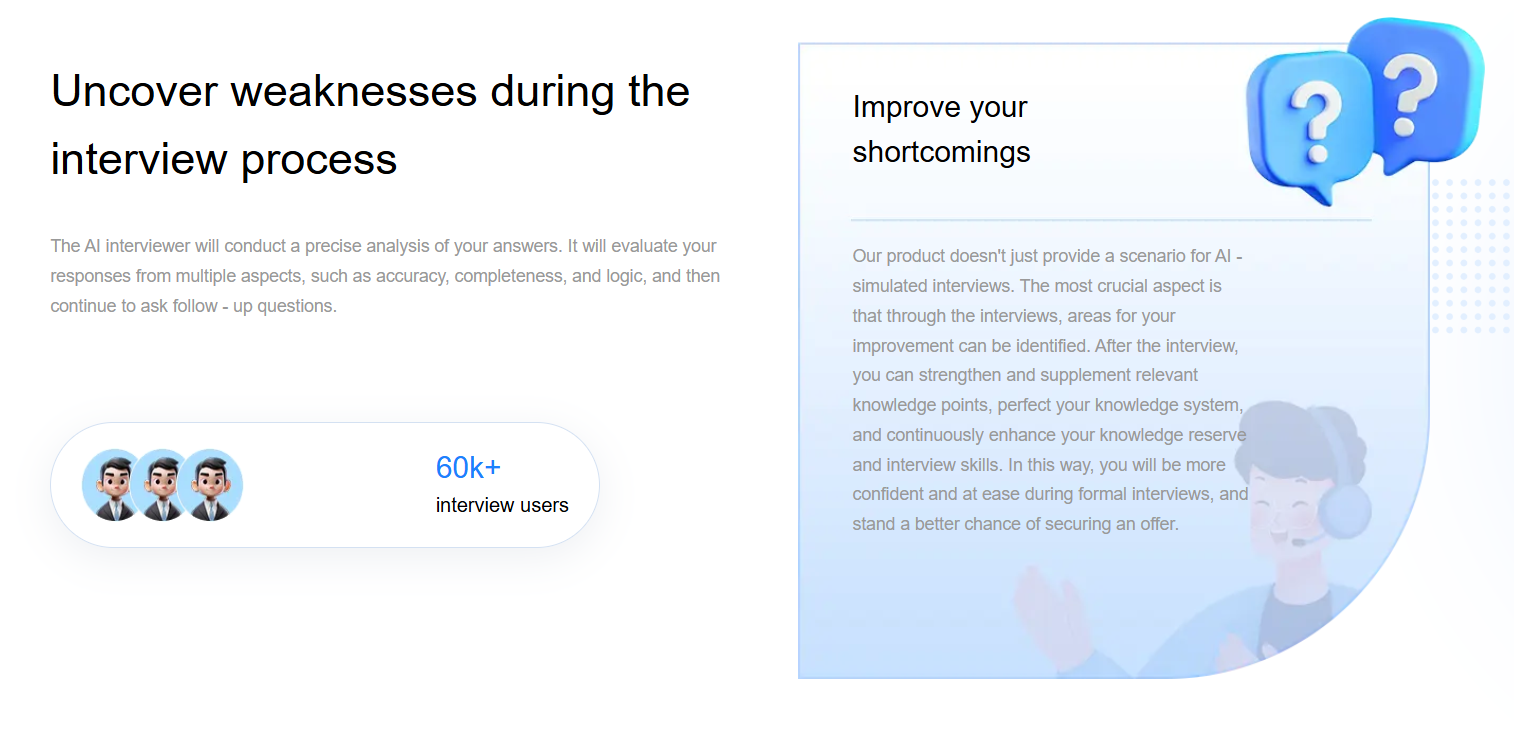Hello everyone, my name is Leo. I’ve been working in the recruitment industry for over 20 years and have extensive experience in hiring. Today, I’d like to share with you the key factors that determine interview success, the main reasons behind interview failure, and how you can increase your chances of getting your ideal job offer.
AI Mock Interviews Can Increase Offer Success Rate by 30%
“Research shows that after mock interview training, interview performance improves by 55–60%, the chance of receiving an offer nearly doubles, and confidence increases by more than 30%.” Lewis C. Lin
Studies show that the majority of candidates fail not because they lack ability, but because they are underprepared and perform poorly under pressure. A LinkedIn recruiting survey indicated that candidates who practiced through mock interviews were nearly 36% more likely to advance to the next round. AI interview tools are designed to address this exact pain point.
In one of my own recruitment experiments, I divided 200 job seekers into two groups of 100 each. One group used AI interview tools more than 10 times, while the other group did not. The results showed that the group using AI mock interviews had a 32% higher chance of receiving an offer compared to the control group.
Across various studies and datasets, the conclusion is clear: using AI mock interview tools before a real interview significantly improves outcomes. AI provides immediate, structured feedback—scoring candidates on logic, communication, professionalism, and role fit—allowing them to identify weaknesses and make targeted improvements. After AI interview practice, candidates not only answer more fluently and align better with job requirements, but also present themselves with greater confidence and professionalism.
Now, let’s analyze the reasons behind interview failures.
Why Interviews Often Fail
Based on years of survey data, the main reasons for interview failure and their percentages are as follows. The biggest factor is lack of preparation—candidates often fail to effectively answer interview questions, which makes them appear unprofessional to the interviewer.
| Category of Failure | % of Cases | Explanation |
|---|---|---|
| Lack of preparation | 70% | Poor preparation for role-specific skills and requirements, leading to unstructured, unfocused answers that erode interviewer confidence |
| Poor communication | 62% | Interviewers highly value positive communication; lack of it is a major obstacle |
| Dishonesty/exaggeration | 52% | Overstating skills or providing false information |
| Lack of enthusiasm | 40% | Interviewers reject candidates who don’t show genuine interest |
| Inappropriate attire | 46% | Poor dress sense, mismatch with job expectations |
| Lack of concrete examples | 43% | Failure to provide specific achievements or evidence |
| Poor understanding of role | 33% | Lack of job knowledge, leading to off-topic answers |
| Punctuality issues | 16% | Being late to interviews |
Lack of Mock Interview Practice
Interviews are like stage performances—without rehearsal, the chances of failure are very high. Without exposure to real interview pressure, many candidates freeze or give incoherent answers. If you prepare answers to the top 10 common questions and rehearse them multiple times, you build muscle memory that helps in real interviews. Most candidates fail not because they lack talent, but because they didn’t give themselves enough “dress rehearsals,” which hurts their performance under pressure.
Limitations of Traditional Mock Practice
When preparing for a target role, candidates often overlook whether they can confidently articulate skills naturally rather than nervously. Many practice with friends, but friends usually just say “it’s fine” and fail to highlight weaknesses—this is fatal.
Another critical issue is that friends cannot simulate real interviewers who ask layered follow-up questions (e.g., “How did you achieve 30% revenue growth?” followed by “But isn’t your approach flawed?”). This lack of realism means such practice offers limited value and lacks structured feedback.
Not Fully Understanding the Role
Many candidates rely on generic questions or canned answers but ignore the most important step: understanding what the job truly requires. Job descriptions are often vague and read like checklists. For example, “experience in marketing campaigns” may not reveal the underlying skills needed. Without analyzing keywords, role priorities, and business context, candidates risk going off-topic.
Typical scenarios include:
- When asked “How does your experience help you with this role’s challenges?”, candidates highlight achievements but not relevant skills.
- Resumes list skills but fail to connect them to solving business problems.
- Answers don’t match the role’s priorities, leading to misalignment with the company’s needs.
Advantages of AI Mock Interviews
Compared to traditional methods, AI mock interviews are more efficient and precise. They generate role-specific questions, provide instant feedback, and allow unlimited practice—delivering a realistic, low-cost interview experience.
| Comparison | Traditional Mock Interview | AI Mock Interview |
|---|---|---|
| Realism | Friends lack expertise, ask generic questions | Simulates professional interviewers with probing, follow-ups, stress interviews |
| Feedback Quality | Vague, subjective (“pretty good,” “be more confident”) | Structured reports with scores on logic, clarity, professionalism, and fit |
| Practice Frequency | Limited by time & resources | Unlimited, anytime, anywhere |
| Personalization | General questions | Custom questions based on resume & job description |
| Cost | High if hiring professionals | Affordable, near-professional quality |
| Scenario Coverage | Limited to few roles | Covers multiple industries, roles, difficulty levels |
| Progress Tracking | Hard to measure improvement | Quantitative scoring, improvement tracking, learning resources |
As someone deeply involved in recruitment, I’ve tried many AI mock interview tools. I recommend OfferEasy AI Mock Interview Tool. It’s simple to use, and many of my peers have landed offers after practicing with it 5–7 times before real interviews.
Simulate Real Human Voice Interviews
Real-time voice interaction creates a highly immersive, realistic interview environment.
Interview Styles of Top Tech Companies
Trains candidates in the formats used by companies like Microsoft, Google, and Meta. This helps refine logical structure and language precision to confidently tackle interviews at top firms.
Interviewer Digs Deeper into Your Responses
The AI asks follow-up questions based on your answers, uncovering both strengths and weaknesses so you can refine your skills.
Uncover Weaknesses During the Interview
AI analyzes your answers for accuracy, completeness, and logic, then challenges you with deeper questions.
Interview Result Evaluation Report
The AI generates detailed scoring and evaluation, pinpointing strengths and weaknesses with actionable suggestions.

Practice + Feedback Training Model
What Is the “Practice + Feedback” Model?
The “Practice + Feedback” cycle is a powerful framework for deliberate practice—similar to how athletes repeatedly review and refine their performance. It includes two core steps:
- Practice: Create realistic scenarios and rehearse, not just study theory.
- Feedback: Immediately receive concrete, actionable feedback to adjust and improve.
High-quality Practice + Feedback is hard to achieve with human mentors due to cost and availability. AI interview tools solve this by becoming your 24/7 personal interview coach.
1. Practice Stage
- Unlimited practice sessions: Train with AI anytime, building confidence and reducing nervousness.
- Highly customized scenarios: Input job descriptions and get role-specific questions, including behavioral, situational, and technical ones.
- Safe space for mistakes: Experiment with different styles without fear of judgment.
2. Feedback Stage
Feedback is the core value of AI mock interviews. AI delivers structured, objective, and data-backed insights with quantitative scores. This mirrors real recruiter evaluation reports and helps candidates measure readiness.
Performance Analysis
- Keyword matching: Does your answer reflect job description keywords?
- Logical flow: Does your response follow the STAR principle (Situation, Task, Action, Result)?
- Relevance: Are your answers on-topic?
Language Analysis
- Speed & pauses: Is your pacing too fast, too slow, or unnatural?
- Filler words: How often do you say “um,” “uh,” “like”? These signal low confidence.
- Vocabulary & professionalism: Are you using precise, relevant terms?
3. Real-World Drill
- Preparation: Copy-paste the target job description into the AI tool.
- Simulation: Answer questions via voice in a quiet environment as if in a real interview.
- Review & Iterate: Study the AI feedback report carefully, focusing on detailed improvement suggestions (e.g., “Use more quantified data when describing outcomes”). Repeat until satisfied.

With about 7 days of consistent Practice + Feedback, you’ll encounter questions you hadn’t considered, build confidence, and walk into interviews fully prepared.